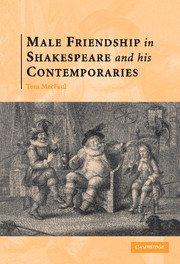Book contents
- Frontmatter
- Contents
- Acknowledgements
- Note on the text and list of abbreviations
- 1 True friends?
- 2 Momentary mutuality in Shakespeare's Sonnets
- 3 Friends and brothers
- 4 Love and friendship
- 5 Servants
- 6 Political friendship
- 7 Fellowship
- 8 False friendship and betrayal
- 9 Conclusion: ‘Time must friend or end’
- Notes
- Bibliography
- Index
1 - True friends?
Published online by Cambridge University Press: 22 September 2009
- Frontmatter
- Contents
- Acknowledgements
- Note on the text and list of abbreviations
- 1 True friends?
- 2 Momentary mutuality in Shakespeare's Sonnets
- 3 Friends and brothers
- 4 Love and friendship
- 5 Servants
- 6 Political friendship
- 7 Fellowship
- 8 False friendship and betrayal
- 9 Conclusion: ‘Time must friend or end’
- Notes
- Bibliography
- Index
Summary
‘Most friendship is feigning’, sings Amiens in As You Like It (ii. vii. 181); this reflects a sense common in Shakespeare's time that friendship was on the wane, becoming increasingly untrustworthy. At the risk of overinterpretation, though, we might find other meanings here: the aphorism contains a deeper truth – that friendship is a fictional relationship, artificial rather than natural, despite Humanist attempts to make it into the most natural of human relationships; further, that most ideas about friendship, derived from the dominant Humanist tradition, were a kind of fakery. Yet the song only suggests that most friendship is feigning, and therefore that some true friendship remains somewhere. Despite the surface cynicism, then, there is a persistent belief that true friendship does exist. Most of Shakespeare's plays and much of the writing of the period are shaped by the Humanist ideal of true friendship, even when they are aware that it is a will o' the wisp, but its main effect is to create a self-assertive individuality coloured and limited by the failure of this ideal.
The Humanist ideology of friendship tries to make friendship the most important thing in the world; the fact that it cannot ever really be the centre of the world – after all, it can hardly even be defined – enables the emergence of a new way of looking at individuality in the literature of this period.
- Type
- Chapter
- Information
- Publisher: Cambridge University PressPrint publication year: 2007



